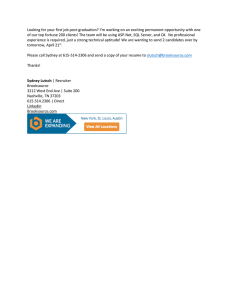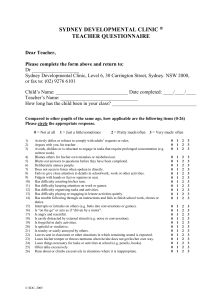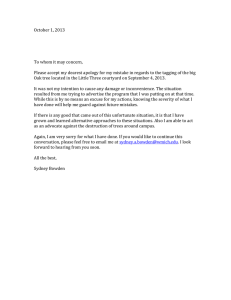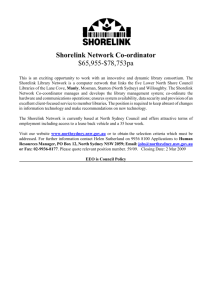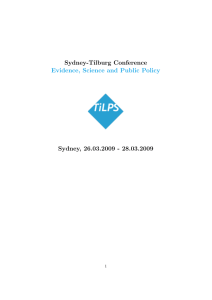Top tips for Mature Age Students
advertisement
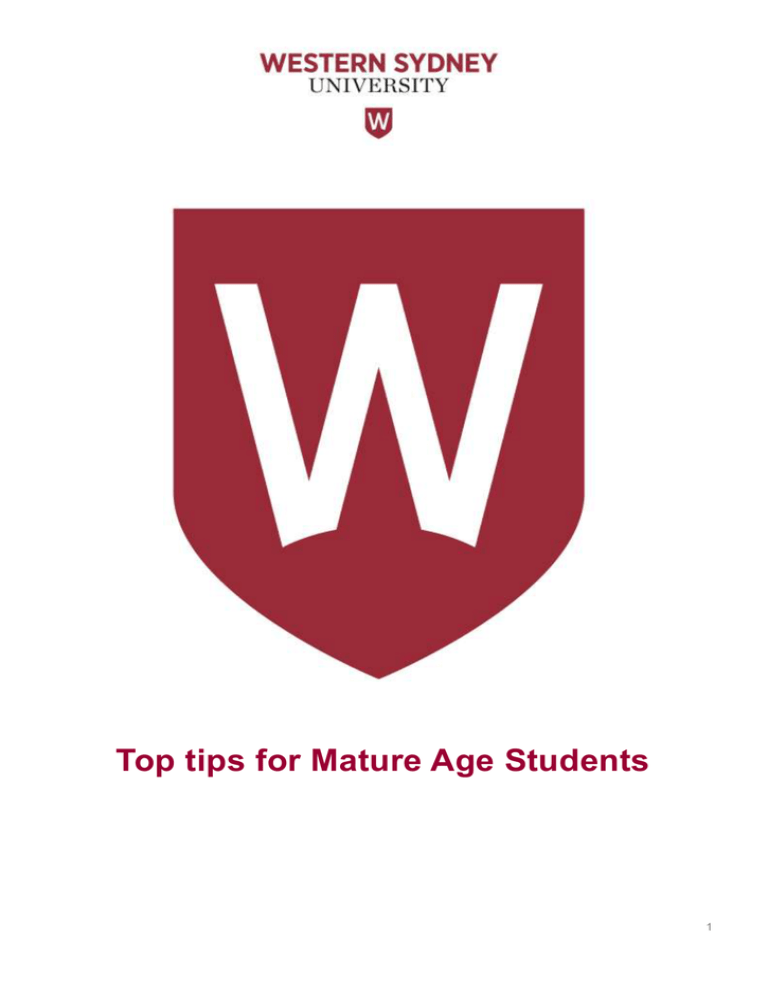
Top tips for Mature Age Students 1 Copyright © University of Western Sydney 2010 First Published July 2010 Version 4 – updated for digital publication May 2016 CRICOS Provider Code: 00917K Commonwealth of Australia Copyright Act 1968 Warning This material has been reproduced and communicated to you by or on behalf of the University of Western Sydney under Part VB of the Copyright Act 1968 (the Act). The material in this communication may be subject to copyright under the Act. Any further reproduction or communication of this material by you may be the subject of copyright protection under the Act. Do not remove this notice. Disclaimer This eBook provides information of a general nature only. If you would like to speak to someone regarding your personal circumstances, please contact the Western Sydney University Counselling or Welfare services. More information about disclaimers, privacy and copyright the University is available online at www.westernsydney.edu.au/footer/disclaimer_and_privacy. Acknowledgements We would like to acknowledge the Mature Age Students of Western Sydney University for sharing their top tips. We would also like to acknowledge the following students for initiating this project: Sylvia-Irene DeSilva, Cordelia Miller, Michelle Reeves and Manal Beydoun. 2 Table of contents Introduction ................................................................................................................................ 4 Prepare for your studies............................................................................................................ 5 Get organised and be proactive ............................................................................................. 5 Online and blended learning at Western.................................................................................. 7 Navigating the online learning environment ............................................................................ 7 Setting up for success............................................................................................................... 9 Start your day the right way .................................................................................................... 9 Your equipment and study environment ............................................................................... 10 Printing and documents ........................................................................................................ 12 Academic and social connections ......................................................................................... 13 Social connections ................................................................................................................ 13 Study success .......................................................................................................................... 15 Lectures, tutorials and revision ............................................................................................. 15 Essay preparation and referencing ....................................................................................... 15 People and resources .............................................................................................................. 18 Librarians, lecturers and tutors ............................................................................................. 18 Physical and mental wellbeing ............................................................................................... 19 Physical wellbeing ................................................................................................................ 20 Mental wellbeing ................................................................................................................... 21 Information and services......................................................................................................... 23 3 Introduction At Western Sydney University, more than one third of students are ‘mature age’. Anyone who has had a gap of one year or more between high school and university is considered to be a mature age student (the official term is non-current school leaver). Mature Age Students are a very socially, culturally, religiously, financially and academically diverse group of students. They have the ability to integrate motivation and a genuine love of lifelong learning into their university experience, as well as possessing the determination, perseverance, resilience and capacity to succeed and overcome hardships. You can use this practical guide to help you through each stage of your course. It is also a tangible token of student partnership, responsibility to others and the culture of caring that is central to the Western Sydney U ethos. This booklet has a collection of tried and tested tips submitted by mature age students at Western Sydney U. These students were asked to share their best advice on how to get the most out of the university experience. In this booklet all ‘top tips’ from experienced students are marked with this symbol. 4 Prepare for your studies Time spent in preparation before the academic session starts gives you a head start. Minimise stress levels and maximise the enjoyment you get from your studies. You can also put these top tips into practice at any time during the year. Get organised and be proactive Investigate what units are available in your course – check the University Handbook and make sure you attend your My Course Planning session. Some courses have core units that are compulsory. For more information, visit the How do I enrol? page. Attend Orientation. It will really help you feel more comfortable in the university environment. Do the pre-session programs. If your spelling, grammar or math needs improvement, it’s very worthwhile checking out the free preparation programs offered. You also get to meet other new students and you’ll know so much more about how everything works at uni. Western Sydney U tip Watch the Orientation video to hear what students say about Orientation at Western Sydney University. Give yourself time to develop the necessary academic skills and to settle in. Have realistic goals; especially in the first years, don’t set the bar too high! Practice touch-typing. When you touch-type you don’t look at the keyboard and only need to think about what you’re typing so you’re able to maintain your focus on the screen. Once you’re at 80wpm then you no longer type in letters, but whole words. Get a whiteboard to hang on your wall to quickly write up important notices and due dates and erase them when you’re done. Having a whiteboard is also great for scribbling down your essay and research ideas before you forget them. Before starting uni, get your eyes checked. If you’re going to have to wear glasses, don’t despair! It will make you feel more intelligent. Try to balance the workload between all your units of study. Allocate equal time to each unit for revision, readings, and assignments. Refer to your unit outline for an indication of how much time you need to allocate to each task. Start slowly and pace yourself. It might be helpful to start with one or two units per session for two years and then move up to four units per session. It’s less overwhelming this way. Hire some help. Hiring a house cleaner, babysitter or even ordering your groceries online might free up some time for you to fit in extra study. 5 Take a mind-mapping course. It will be great in terms of helping you to think about concepts and their related ideas. You could also try a speed-reading course. Locate your lecture theatre or tutorial rooms early. It can take longer than you expect to get from one place to another on campus and you don’t want to arrive all sweaty and stressed on the first day. Find out what it all means. If you’re unsure about what all the terminology means around here, there’s a glossary on the website. Use the Student Diary. It has so much useful information related to studying at Western Sydney University and you don’t have to rely on batteries to make it work! Help is available! The university offers an amazing range of resources and services to help to help you on your way to feeling more confident in your abilities. Put your calendar on the fridge. Then family and friends will know when you’ll be busy with exams or assignments. Ask for help if you are feeling lost. Most people are happy to help if they can, and you might be surprised by how many other people at uni feel the same way. Western Sydney U tip Have a look at the guide to study at Western Sydney University, and check out the great range of free workshops, programs and online resources the University offers that can help you improve your academic, maths, study and life skills. Finding out where your classes are and planning your journey to campus is really important and really easy. Visit the getting to uni webpage to find out about all the travel options for each campus. Get to know your campus in detail on the campus maps webpage. 6 Online and blended learning at Western Online and blended learning at Western Sydney University is designed to give students greater access to flexible, engaging and socially relevant learning opportunities. Here are suggestions from Mature Age Students who were relatively new to computer technology and were successful in adapting to the online learning environment. Navigating the online learning environment Food for thought: Adapting to technology It’s really normal to feel more or less overwhelmed in the first few months at uni. There’s a lot to take in academically, socially and technologically. Mature age students often worry about how they will manage the technology side of things, especially if they have not grown up with computers. Here are some practical tips and hints from mature age students who have succeeded in making the transition to the world of online learning and technology. Technology can be frustrating even when it’s working. Don’t give up, remember that it’s a process of learning and you can do it – just work through it step by step. Check your student email account every day – even during your session breaks. It’s the official communication channel between you and the University. Don’t miss emails with important information about things like your enrolment, exams, results and graduation. Keep a notebook to help you remember how things are done or where you found things on your iPad, computer or online. Bookmark all your most useful websites. Explore the University website – click on everything. You won’t break anything and there are so many useful resources to help you. Read (and re-read) your unit outlines and learning guides. These are the ‘road maps’ for each unit. If you get bogged down with an assignment go back to the unit outline and check the ‘learning outcomes’ to give you direction. Keep phone numbers handy. Make sure you know who to call for technical support and keep your home internet service provider’s number handy in case your system fails. Back up everything! You never want to find out how it feels to lose your final draft at 2.00am on the day your assignment is due. Put your name and phone number on your USB and any of your cables, chargers or equipment. That way, if you it leave somewhere, like the Library, someone can return your property (and all your hard work). 7 Buy a big screen monitor. You’ll be able to see two documents at once and you can review them simultaneously. Send yourself an email with the latest version of your documents as attachments, to make sure you don’t lose your documents in case you lose your USB or your computer crashes. If you need to pick something up from an earlier version, you can search through old sent emails, and there it is. Ask for help. Ask other students, Librarians, the ‘Ask Us’ assistants, your tutors or lecturers - especially ask your kids! Western Sydney U tip If you’re new to vUWS, you can find out what it’s all about and get advice on how to use the site on the E-Learning webpage. Explore your vUWS (virtual Western Sydney) site. Under the ‘For Students’ tab you can find everything you need to help you to feel more confident with online learning. Log in to vUWS, using your WesternAccount. Test the equipment before you give your presentation. Try it out in the room where you have to present because so many things can go wrong and you don’t want to be spending your presentation time under the desk looking for cables or connections. 8 Setting up for success Ideal study conditions are different for each person, but these suggestions from mature age students might give you some ideas on how to make your study time more focused and enjoyable. Start your day the right way Food for thought: Studying at uni is a marathon, not a sprint Most mature age students have very complex lives with multiple demands on their time, finances and energy. A university degree takes at least three years to complete (if you’re studying full time) and so it’s important to pace yourself – if you try to do too much too fast, you might burn out and find the rest of your studies much harder. While there is no magic formula that works for everyone there are practical tips and strategies that can help set you up for success. Make a list of the things you need to do for the day. Then tick them off as you complete them – each one becomes a psychological mini-reward. If when you make your ‘to do list’, you find it’s very long, alternate each bullet point with different formatting or colour. It makes your list easier to read, especially if your eyesight is not great. Allocate an hour at the beginning of each day to settle in. In this time you can sit down, get up, feed the fish, sit down, get up, water the plants, sit down, get up, make some tea or coffee and check emails. Establish a routine that starts from when you get out of bed. Make sure your work space is clean and free from distractions. This will help you get in the right frame of mind for studying. Get dressed every day. Don’t stay in your dressing gown or slippers all day or you’ll find it much harder to get into ‘work mode’. Separate your ‘work’ area from your ‘living’ area and ensure any possible distractions are out of reach (e.g. TV, Facebook). Start each day the night before. Collect the things you need, make your lunch and get the sleep you need for your body and brain to recharge. 9 Your equipment and study environment Make sure your study space is well lit with natural light and ventilation but not too much direct sunlight that glare becomes an issue. Good air flow is conducive to clear thinking. If good air flow is missing, open a window or door or introduce an air-purifying plant to the room. If you’re serious about your studies, be serious about your working environment. Create a study area that makes you feel good; a sturdy desk, a comfortable chair, a desk lamp and something nice to put on the desk like a plant, photograph or essential oil burner. Keep your workspace clean. To remove dust and bacteria from your computer keyboard, simply dip a cotton wool bud into methylated spirits and clean between the keys. If you have a laptop or tablet think about getting a keyboard and mouse to plug in when you’re using it at home – this is easier to use than a laptop keyboard and touchpad, or tablet screen keyboard, and will also help prevent bad posture from sitting with you’re the device on your lap. Be aware of your posture. Try not to slump or hunch over your desk or laptop. And make time to stretch - your back, shoulders and neck will thank you. 10 11 Printing and documents Think before you print. Read all your documents and readings before deciding if they need to be printed out. Make your ink go further. Change the font colour for each draft or journal article that you print. This way the black ink won’t run out so quickly. And you can see each document in different colours so you don’t get confused searching through them all. Always keep some spare ink cartridges so you don’t run out of ink in the middle of printing out your assignment. Save money on ink by buying cartridges in bulk. There are some companies that sell generic cartridges instead of expensive brands - just make sure they are compatible with your printer. Buy only recycled paper. Your conscience will thank you for it and it will be the most responsible choice considering how much stuff we print out over the course of a year. Save paper by printing everything double sided – you’ll use less paper and have less clutter to sift through. Use different background colours for your document drafts so you don’t get the latest versions mixed up with earlier ones. Be creative – this will help your memory and recall as well. Western Sydney U tip Familiarise yourself with the printing and photocopying services at the library. There is a library on every campus, and each one has high speed, quality copying and printing at a reasonable cost. Information about these services, operating procedures and associated equipment can be found in the photocopy rooms or by asking at the library service desk. Make a ‘latest version’ file for your computer desktop. This will help you to copy and paste essays easily to Turnitin and ensure the one you’re using is the one you submit. Print out your final copy and read it carefully. Things look different on paper than on the screen. 12 Academic and social connections Your time at Western Sydney University is valuable – to you and the University. The academic and social connections you make at university can make a huge difference to both your own success and to other students as you share your own experiences and knowledge. Social connections Contact some students who did the unit before you. This will help to relieve any fears or doubts you may have about the unit. Dedicate time to unwind with friends or family, even if it’s just going for a walk. Surround yourself with fun and interesting people so you’ll always have good conversation, second opinions and different perspectives of the world. Make friends with other students from your tutorials or lectures. You could suggest lunch or coffee together before or after class as a way of connecting with these students. Form supporting relationships. These will help you in completing your assignments, like a group of study buddies. Find some volunteer work in doing something you enjoy. It’s great experience to put on your resume and may give you an opportunity to apply what you are learning in a practical situation. 13 Western Sydney U tip Links and suggestions for academic and social connections Whether you’re looking for a group to socialise with or just someone to say ‘hello’ to in a tutorial, we offer many opportunities to make those allimportant connections that can make a positive difference to your experience as a student. Clubs and societies – there is a wide range of clubs and societies including course related, cultural, social, political, religious, music art etc. Peer Assisted Study Sessions (PASS) – a free and voluntary studentcentred learning program. In PASS you will meet and work with other students to understand the content of your unit/s and develop study strategies to help improve your academic performance. MATES – Mentoring and Transition Equals Success (MATES) is a program that links trained and experienced student mentors with first year students for the first six weeks of session. 14 Study success This section has tips from mature age students about how to succeed at university, including information about tutorial and exam preparation, juggling the demands of multiple units of study and who to ask for help. Lectures, tutorials and revision Start revising from week one. Start organising your readings and notes at least a week before you need them for tutorials so you’ll always be prepared. Prepare for lectures, even if they’re online. Get dressed (so you’re in the right mindset), take notes and think of questions you might like to ask your lecturer. Make sure you go to your tutorials. They are your opportunity to ask questions and discuss issues that you might not have had the chance to raise in the lecture. Make a PowerPoint presentation for each unit. Start in week one and you will have a visual summary for revision as you go. Use the unit outline as a guide to help you stick to the learning outcomes for your unit. Western Sydney U tip Learn all you need to know about virtual classrooms, online lectures, tests or assignments on the using technology webpage. Go to all your lectures even if you can get the notes online. Lecturers will often give extra information there and if they see you regularly they can be more inclined to help you. Use the Student Diary to keep track of the weeks during the teaching sessions. Don’t let due dates sneak up on you! Ask for help. If you don’t know something – just ask! Essay preparation and referencing Start thinking about your essay question as soon as you get it. Often they are in the unit outline, which may be available before you start the teaching session. Look in advance for the books you’ll need. Check out the referencing textbooks available from the library or bookshop. They’ve got heaps of information about how to write according to academic standards, as well as referencing rules and guidelines. Information is also available on the Library website or you can chat online with a Librarian. Early in the unit, organise your essay cover pages, the styles for paragraphs and referencing (these are often different for each unit). That way there’ll be less to think about when you’re busy working on the essay itself. 15 Try to make a plan of your essays (dot points will do), a first draft and a final draft completed with one week between each. This helps avoid procrastination and helps dispel the ‘desperate fear of the blank white page’. Prepare for essays as early as possible. If you leave everything to the last minute and say ‘that’s when I work best’, you will never know the real quality of work you can produce. Where possible, complete assignments in advance and tick them off. For example, a portfolio that requires you to summarise any five texts in the reader can be completed well in advance of the due date. If you are stuck for ideas wait for an epiphany – but don’t wait too long. Plan ahead and wait for the magic. Try writing the essay’s main paragraphs first so you get a feel for what you’re writing. Then write the introduction afterwards once you know what your argument is. Then write the conclusion. The conclusion shows how you’ve covered the points you were going to cover in the introduction, plus an analysis. 16 When editing your essay, save the discarded bits on another page with the appropriate reference. If you need to pick up the info again, there it is. The University always provides marking criteria. Read this in advance and make sure you have done everything needed to achieve the marks you want. Never underestimate how long it takes to reference, especially if you have a variety of resources to reference (e.g. books, journals, websites, newspaper articles etc.). Make sure you double-check that all your references are included when you are at your final draft, and that the references at the end are still part of the content of your essay. Reference and format as you go. It can take hours to format the references if you leave it all to the end – use that hour for your editing, not formatting. Format your references exactly how you’re instructed. Always be consistent with margins, font, referencing and presentation as you may lose marks for inconsistencies. Western Sydney U tip Avoiding plagiarism: Plagiarism is the unauthorised use or close imitation of the language and thoughts of another author and the representation of those words or thoughts as one’s own original work. Plagiarism is a form of stealing. Plagiarism is considered to be academic misconduct. If you are caught plagiarising, you will be subject to disciplinary action. Incorrect or insufficient referencing may be seen as plagiarism, so make sure you reference correctly. Help and advice: The University Library staff are happy to help you to find the information and resources you need for your unit requirements. You can also find style guides for the most commonly used citation styles within the University on the Library website – Library referencing guide. Remember that not all units use the same referencing style. Check the Unit Outline for every unit. Turnitin: Turnitin is a software program that checks assignments for plagiarism. Find out more about Turnitin. 17 People and resources University can be a little overwhelming and can sometimes be a bit lonely. It’s not always easy to know who to ask for help, what resources are available or where to find information. Librarians, lecturers and tutors Lecturers and tutors like people who are keen and interested in their material. Remember, what they are teaching is very likely to be their field of interest so go up to them if you have any questions or to discuss the material they are sharing. Consider getting some tutoring if you’re struggling with one of your units. It’ll cost in the short term, but will be money well spent. The librarians are really helpful and friendly. Don’t be afraid of asking for help from the librarian – they’re one of your best resources at uni. Western Sydney U tip Learn to love the Library. Take the time to get familiar with the resources on offer at your campus Library. We recommend you do a tour as it will help you feel more confident with navigating the Library, learning how to search for books and journals, and using the other useful resources like printing and copying. You should also check out the University Library website and the resources relevant to your area of study, such as the main journals, books and databases. Find out more about printing at the library. Post on the vUWS discussion boards for a study buddy. This is extra assistance and extra motivation. It might also be better to go for a mature age student rather than a recent school leaver as the needs of each group are different. Ask for help if you’re feeling lost with the computer or online systems. Librarians and technical officers in the IT Labs are more than happy to show you. Pass on your knowledge. Consider becoming a PASS facilitator or simply be willing to share what you have learned informally, by just being helpful. Get the books to come to you. Requesting books from other campus libraries is easy. You don’t have to travel to other campuses for them – just place an online request. Books can be requested online if they’re at a different campus or on loan to someone else, so that you’re the next person in line when it is returned. So if you need a book from the library but it isn’t immediately available, don’t panic or give up. Textbooks can be really expensive. If you can’t afford to get them all, most will be 18 available on loan from the Library. Remember to check in the Reserve collection in the Library and don’t forget to use the online reading lists created by the University Library – you can usually find these in your vUWS site under ‘Readings and Resources’. Apply for a scholarship, even if you don’t think you’d qualify. It can make a huge difference in terms of being able to buy all the required textbooks and other equipment. Ask a Student Welfare Officer to help you with the scholarship application if you’re unsure how to do it. Western Sydney U tip If you are finding the cost of books too much, there are some options available to you: See the Student Welfare Service to find out about textbook vouchers, financial grants and loans available for students who are eligible. Second-hand textbooks are often advertised around campus, on student discussion pages and through textbook exchange websites. The University Store has a bookshop on each of the main campuses where you can purchase your own textbooks. Be sure to check that the books you wish to purchase are the correct editions. Note: Whether you’re buying new or second hand books, or using a Library copy please, make sure you check that the books you use are the correct editions. Physical and mental wellbeing 19 Getting enough sleep, staying active and limiting junk foods – we all know this is what we should do but the pressure of university study, work and other commitments can make it a challenge to stay fit and healthy while studying. Experienced mature age students tell us why they think it’s worth the effort, and share their tried and tested tips for maintaining wellbeing while studying. Physical wellbeing Buy lots of little tins of tuna – no preparation required and it’s instant brain food. Eat a balanced diet to ward off sluggishness. Keep your supplies well stocked. Keep a bottle of water and a small packet of nuts or dried fruit in your bag at all times as they’re a great energy boost. Staying up for all-nighter essay writing can mean pigging out on lollies and soft drinks. If that’s the case, at least save yourself some money and make your soft drinks go further by diluting them with water or soda water – you can dilute it quite a bit before it even starts to go bland. Boost your immune system. Having lots of assignments and readings and staying up late can take a toll on the immune system. Up your intake of garlic for a couple of days. Garlic is an antioxidant that can help boost your immune system. Western Sydney U tip The University has a gym on most campuses and students get a membership discount. Find out more about the gym on your campus. Get enough sleep. Your body and brain need the opportunity to recharge. Things really do look better in the morning after a good night’s sleep. Exercise increases your ability to think and it also de-stresses you. If you live close to the uni, get a bike and cycle there. It’ll help you feel fitter, smarter, and better. You’ll be reducing your carbon footprint too. 20 Mental wellbeing Goal setting is a good way to keep you motivated throughout the teaching session. Placing an image, photograph or list of these goals on your desk will act as a constant reminder of what you are working towards. Let your family and friends know about the workload you’ll be facing for the session so they’ll understand why you can’t spend as much time with them as you and they would like. Western Sydney U tip If you want to talk to someone or get advice about personal issues or your general wellbeing, you can get in touch with the Counselling Service. They offer help and advice face to face, online (via eCounselling), through Skype and over the phone. General information about mental health and wellbeing is also available on our mental health and wellbeing website. Try mindfulness meditation. It is like taking a mini mental holiday from the worry and negative mental chatter that can wake you up in the wee hours of the night. Look it up on Google or ask the University counsellors how to practice mindfulness meditation. Meditating can help to calm nerves before or after an exam or completing an assessment like a group presentation. Always be on time to lectures, tutorials and when submitting assessments. Running late to things can add unnecessary stress to your life and make you feel like things are getting a bit out of control. As clichéd as it sounds, believe in yourself. Have faith in your abilities – try your best and hope for the best. An aromatherapy oil burner is great. Make sure it has a deep dish. Tea light candles are relatively cheap from budget stores. Lavender oils are very soothing. Peppermint oils and incense encourage mental clarity and focus. Great for studying. When you get your assignments back with a low mark, don’t despair because this is the perfect opportunity for you to learn from your mistakes. Go to your tutor and ask where you lost your marks and see how you can improve. Do this for every assignment. This will also help you develop a good working relationship with your tutor. Failing a unit doesn’t make you a failure. There are alternative ways to complete your degree within the specified time, like taking an extra unit or studying during Summer Session. Schedule down times throughout your day or week to do something you enjoy. This may involve exercising, reading, watching a movie, catching up with family and friends or even catching up on some sleep. 21 When you have achieved your goals, reward yourself! Make a list of the activities you can’t fit into your schedule while you’re studying and use the session break to do one or all of them. You may like to go for a massage, see a band, play some sport, take a holiday or organise a night out with your friends. Sigh! Take a deep breath and stretch. Do this regularly whether you’re studying, reading or in an exam. A few deep breaths can release tension and help to put things in a better perspective. You are not an ‘impostor’, you have earned your right to be at uni. Sometimes you have to claim your right to be here but first you need to believe it yourself. Start from your strengths. When you’re studying, start with what you like or are good at. That way you’ll get some ‘wins’ on the board as you build your way to your weaker areas or subjects. 22 Information and services Student Central – your first point of contact Student Central Infoline: 1300 668 370 Email: studentcentral@westernsydney.edu.au www.westernsydney.edu.au/studentcentral Security and emergency information 24-hour Security Hotline: 1300 737 003 Emergencies (police, fire, ambulance): 000 www.westernsydney.edu.au/security Academic Literacy workshops www.westernsydney.edu.au/academicliteracy Accommodation www.westernsydney.edu.au/accommodation Campus life, food and fitness services www.westernsydney.edu.au/services Campus maps www.westernsydney.edu.au/campusmaps Career advice, jobs and workshops www.westernsydney.edu.au/careers Childcare centres www.westernsydney.edu.au/childcare Counselling, mental health and wellbeing www.westernsydney.edu.au/counselling Disability and chronic illness services www.westernsydney.edu.au/disability Glossary of University terms www.westernsydney.edu.au/glossary International exchange programs www.westernsydney.edu.au/goglobal IT and systems support www.westernsydney.edu.au/its MATES program www.westernsydney.edu.au/mates Maths Start workshops www.westernsydney.edu.au/mesh Mature age information www.westernsydney.edu.au/matureage Mulifaith Chaplaincy www.westernsydney.edu.au/chaplaincy 23 PASS (Peer Assisted Study Sessions) www.westernsydney.edu.au/pass Printing, copying, scanning and binding services www.westernsydney.edu.au/printservices Scholarships www.westernsydney.edu.au/scholarships Services for Indigenous Students www.westernsydney.edu.au/badanami Services for International Students www.westernsydney.edu.au/internationalstudentsupport Starting at Western Sydney University website www.westernsydney.edu.au/starting Student Representation & Participation www.westernsydney.edu.au/studentrepresentation Student Services Fair www.westernsydney.edu.au/servicesfair Textbooks www.theuniversitystore.com.au Transport and getting to uni www.westernsydney.edu.au/gettingtouni Online student support hub www.westernsydney.edu.au/onlinesupport Western Sydney U Facebook page www.facebook.com/westernsydneyu University Library http://library.westernsydney.edu.au Western Sydney U Twitter feed www.twitter.com/westernsydneyu Western Wifi wireless network www.westernsydney.edu.au/westernwifi Welfare, financial help and accommodation assistance www.westernsydney.edu.au/welfare Workshops, programs and online resources www.westernsydney.edu.au/workshops 24
